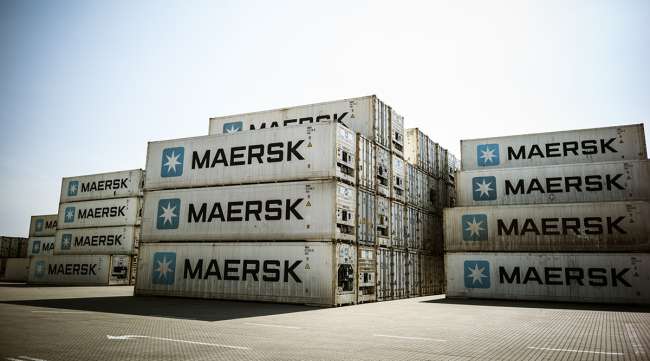Maersk Profits Slip in Q1, Forecasts Weak 2023

[Stay on top of transportation news: Get TTNews in your inbox.]
A.P. Moller-Maersk A/S, a bellwether for global trade, signaled weaker results for the rest of 2023 after reporting first-quarter operating profit that tumbled by more than half with transport volumes slowing and freight rates plunging.
Maersk, which transports close to one-fifth of the world’s containers, warned that the first three months of 2023 “will be best quarter of the financial year,” the Copenhagen-based company said in a statement on May 4. It expects global economic growth to remain “weak” at around 2% this year.
There’s “still a lot of clouds that we need to handle,” Chief Executive Officer Vincent Clerc said in an interview with Bloomberg TV.
As business activity slows, companies are seeking to reduce inventories at warehouses rather than moving new goods from Asia to Europe and the U.S. That’s a sharp turnaround from 2021 and 2022, when a spike in demand for consumer goods during the COVID-19 pandemic, coupled with supply chain issues limiting vessel supply, led to record profits in the freight industry.
In the first quarter, Maersk reported a 56% drop in earnings before interest, tax, depreciation and amortization to $3.97 billion. That compares with a median estimate of $3.55 billion in a survey of analysts. Volumes declined 9.4% in the quarter, and freight rates fell 37% and are close to the break-even level, according to the CEO.

The shipping company repeated its forecast that the world’s container transport volumes may shrink as much as 2.5% this year. It also stuck to its own full-year financial forecast of underlying EBITDA of $8 billion to $11 billion, which is roughly a quarter of the 2022 figure.
To avoid a more severe downturn, Clerc indicated that the shipping industry needs to be disciplined on capacity and may have to idle more vessels later this year.
“We’ve already seen a lot of capacity being blanked to match the lower volume demand,” he told Anna Edwards in the Bloomberg TV interview. “There’s also some supply side risks in the form of new ships coming into service in the second part of the year and in the next. This will create a new challenge for the industry.”
Maersk ranks No. 5 on the Transport Topics Top 50 list of the largest global freight carriers and No. 26 on the TT Top 100 list of the largest logistics companies in North America.
— With assistance from Frances Schwartzkopff.
Want more news? Listen to today's daily briefing below or go here for more info:




